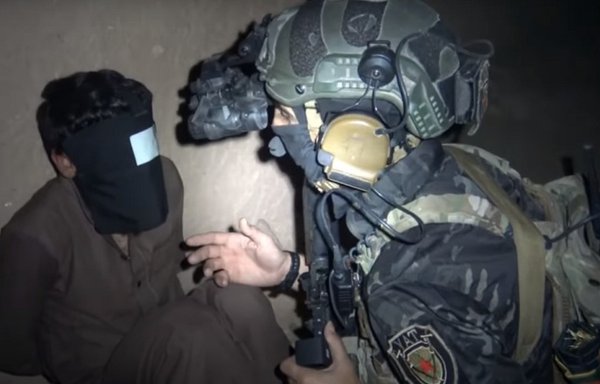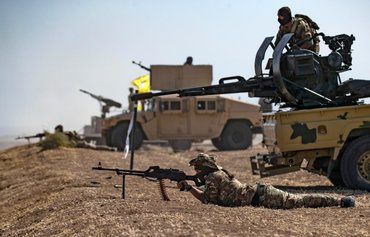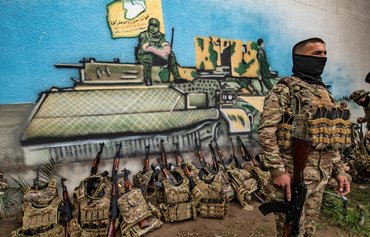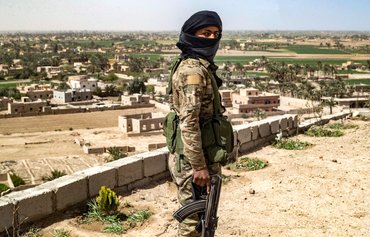More aggressive Iranian efforts to target US military personnel in eastern and northeastern Syria are unlikely to succeed in driving out US forces or to receive much support from the local population, Syrian observers said.
Iran is planning an escalation against US forces in Syria, according to leaked intelligence documents described in a June 1 Washington Post report, by training and arming militants for a new phase of attacks.
A unit from the Islamic Revolutionary Guard Corps Quds Force (IRGC-QF) in January directed and oversaw testing of one of the "more powerful armour-piercing roadside bombs" it is building in Dumayr, the report said.
Explosively formed penetrators (EFPs) are a more dangerous version of the improvised explosive devices (IEDs) used to target US forces in Iraq, it said.
![A member of the Syrian Democratic Forces (SDF) and US soldiers are pictured near an armoured military vehicle on the outskirts of Rumaylan in Syria's al-Hasakeh province on March 27. [Delil Souleiman/AFP]](/cnmi_am/images/2023/07/18/43004-SDF-US-forces-600_384.jpg)
A member of the Syrian Democratic Forces (SDF) and US soldiers are pictured near an armoured military vehicle on the outskirts of Rumaylan in Syria's al-Hasakeh province on March 27. [Delil Souleiman/AFP]

A member of the special forces of the Syrian Democratic Forces is seen here after arresting an ISIS element in southern al-Hasakeh province, in a screenshot from from SDF Press video posted June 16.
The intelligence document detailing Iran's plans, leaked on the messaging platform Discord, appears to be based on intercepted communications by Syrian and Lebanese militants allied to Iran, the newspaper said.
It is one of a number of leaked documents that together show plans for a wide-ranging campaign by US opponents -- including Russia -- that would involve stoking popular resistance and supporting a grass-roots movement, it said.
Another leaked classified document from the same source reveals that high-ranking Russian, Iranian and Syrian military and intelligence officials in November agreed to establish a "co-ordination centre" for the campaign.
The goal of the campaign would be to expel US forces from areas of Syria controlled by US-backed Kurdish forces and restore them to Syrian regime control.
But Syrian analysts who spoke to Al-Mashareq said the effort is not likely to yield the results the Iranian, Syrian and Russian regimes are seeking.
US forces play a key role
Iranian, Syrian and even Russian plans to expel US forces from eastern and northeastern Syria will not deliver any real results, Syrian journalist Mohammed al-Abdullah told Al-Mashareq.
He noted that US forces were instrumental in the defeat of the "Islamic State of Iraq and Syria" (ISIS) through their support for the Syrian Democratic Forces (SDF) and that their continued presence helps with civilian security in the region.
A US air strike on July 7 killed a top ISIS leader in eastern Syria.
"If reports about the co-ordination centre and the incitement of military attacks against US forces are correct, this would be disastrous for eastern Syria," Deir Ezzor activist Ayham al-Ali told Al-Mashareq.
"This region is tribal, and most clans have excellent relations with the US forces and the SDF," he said. "The two sides meet on a regular basis to determine the needs of the eastern Syrian population."
Most of the region's residents do not want any harm to US forces, he said, adding that "nor will they, of course, allow any harm to befall their sons who have joined the SDF or the Syria Free Army".
US forces have provided vital support to the Syria Free Army (formerly known as Jaish Maghawir al-Thawra), which controls al-Rukban camp in the tri-border area.
This support has enabled camp residents who fear returning to Syrian regime-controlled areas to remain there in safety.
US forces have helped to secure clean water for al-Rukban and to build sewage drains and provide electricity, and have supported the camp's clinic by providing training for its workers and essential medications and vaccines.
The presence of US forces also is keeping a lid on a potentially explosive situation, as the parties to the Syrian conflict vie for control of the area, a 55km-radius deconfliction zone where the borders of Syria, Jordan and Iraq converge.
'Ink on paper'
Russia and Iran "are betting on creating local rivalries for power in northeastern Syria to stir up unrest and inflame sentiments against Kurdish forces and the United States", al-Ali said.
But while Russia and Iran are allies, there is also some friction between them, especially regarding the exploitation of Syria's resources.
"It is not possible for Iran and Russia to agree on the management of the conflict against US forces in Syria," political researcher Abdul Nabi Bakkar told Al-Mashareq.
He noted that for its part, "Moscow is unable to closely follow the events on the ground amid its war on Ukraine".
Additionally, "both Russia and Iran have aspirations and plans for the post-war period in Syria, and each side will seek to sideline the other or diminish its control", he said.
Northern Syria is a critical area from a military and an economic standpoint, as it has a large number of oil wells, natural resources and vast agricultural areas, and this intensifies the Iran-Russia rivalry, Bakkar said.
"Therefore, any talk of a co-ordination centre is merely ink on paper and will not bear any fruit, despite the currently strong relationship between Russia and Iran," he added.

![US forces patrol in the al-Hasakeh province town of Tel Maaruf on December 15. [Delil Souleiman/AFP]](/cnmi_am/images/2023/07/18/43005-US-soldier-child-600_384.jpg)






